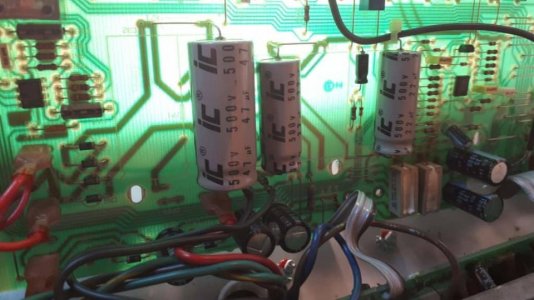Markk
New member
I'm moving away (ways away) from my humbucking LP through a Marshall to a Fender + Fender sound. Something I've been yearning to do for years and after a long hiatus from general playing, the time has come...
So I have the guitar, a brand spankin' new American Pro II Strat (NGD post coming soon I hope). I'm on the hunt for an amp.
I started with research on Blues Junior and Pro Junior, then was drawn in by Fender's 68 Custom Vibro Champ. Excellent reviews. Still tube. Seems quite playable at home.
However, scouring the internet I stumbled upon Fender's Tone Masters (I missed this during my AWOL period). And now I'm on the fence, debating whether I should go the Vibro Champ route and still do the tube thing, or whether something like a Tone Master Twin Reverb or Tone Master Deluxe Reverb is 'better'.
The 68 Custom Twin Reverb and Deluxe Reverb are outside $$ allowance (however, there are outlet versions which are plausible, BUT the Deluxe's tremolo doesn't work, and I don't know what's wrong with the Twin. Gonna find out).
Financially the VC, and TMTR and TMDR all in an acceptable range. I can occasionally crank it in the house, and hope one day to get back into jam sessions. I'm diggin' the idea of the available attentuation on the Tone Masters. I am wondering about the longevity of the Tone Masters. As described by someone online, it's a laptop with speakers and knobs. My laptops have only gone 'obsolete' because the processing power started to lack when burdened by newer OS and program. But these are "single purpose laptop" amps, so I can't imagine they will suffer from a lack of processing power...
Your thoughts?
So I have the guitar, a brand spankin' new American Pro II Strat (NGD post coming soon I hope). I'm on the hunt for an amp.
I started with research on Blues Junior and Pro Junior, then was drawn in by Fender's 68 Custom Vibro Champ. Excellent reviews. Still tube. Seems quite playable at home.
However, scouring the internet I stumbled upon Fender's Tone Masters (I missed this during my AWOL period). And now I'm on the fence, debating whether I should go the Vibro Champ route and still do the tube thing, or whether something like a Tone Master Twin Reverb or Tone Master Deluxe Reverb is 'better'.
The 68 Custom Twin Reverb and Deluxe Reverb are outside $$ allowance (however, there are outlet versions which are plausible, BUT the Deluxe's tremolo doesn't work, and I don't know what's wrong with the Twin. Gonna find out).
Financially the VC, and TMTR and TMDR all in an acceptable range. I can occasionally crank it in the house, and hope one day to get back into jam sessions. I'm diggin' the idea of the available attentuation on the Tone Masters. I am wondering about the longevity of the Tone Masters. As described by someone online, it's a laptop with speakers and knobs. My laptops have only gone 'obsolete' because the processing power started to lack when burdened by newer OS and program. But these are "single purpose laptop" amps, so I can't imagine they will suffer from a lack of processing power...
Your thoughts?

